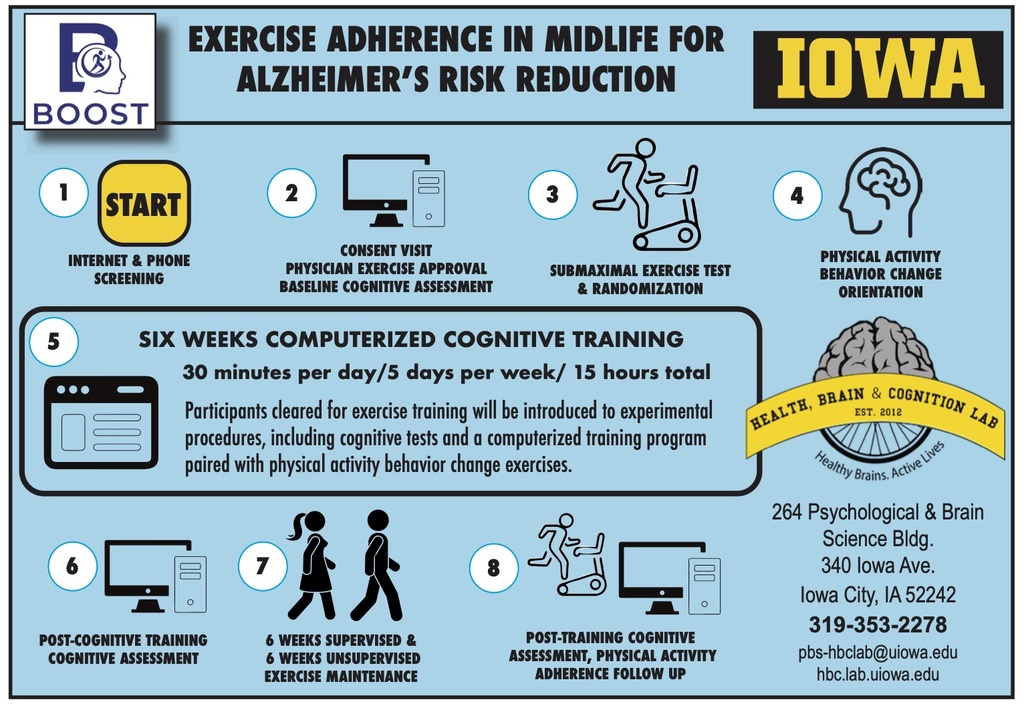
The HBC Lab’s BOOST study will test whether middle-aged brains can be trained with adaptive computer games to overcome difficulty changing sedentary habits.
Middle-aged people generally know that moderate to vigorous intensity exercise is good for their bodies and brains, but too many don’t stick with their exercise programs. The Health, Brain & Cognition Lab at the University of Iowa has devised a study to test whether the brain can be trained with adaptive computer games to overcome difficulty changing sedentary habits and negative feelings that derail good physical activity (PA) and exercise intentions.

The BOOST PA study, formally named “Targeting Cognitive Control to Improve Physical Activity Adherence in Midlife for Alzheimer's Risk Reduction,” will develop and test the efficacy of cognitive training strategies designed to improve self-regulatory
capacities for middle-aged adults to adopt and sustain a physically active lifestyle. Partners in the study are Northeastern University in Boston and the research and development arm of San Francisco-based Posit Science, developer of BrainHQ computer-based cognitive training exercises. The trial is funded by the National Institute on Aging at the National Institutes of Health.
The hope, says HBC Lab Director Michelle Voss, is that strengthening the brain’s executive function can help people persist in their behavior change towards being more physically active at higher intensities in their workouts, building habits that will boost their physical and cognitive health for the long-term.
“Our overall hypothesis is that cognitive training designed to improve cognitive control will increase the success of a physical activity behavior change program,” she says.
The games used in the study are designed to build skills in areas such as task-switching and inhibitory control that could facilitate health-promoting lifestyle changes by enabling someone to stick with a new behavior when confronted with the impulse to change their mind or quit.
Recent research highlights the potential for physical activity to spark a virtuous cycle of health behaviors and cognition. The virtuous cycle is completed if more disciplined physical activity improves cognitive control, strengthening resources for adopting and maintaining cognitive health promoting behaviors.
Another scientific premise underlying the study is that the feelings experienced during moderate to vigorous physical activity play an influential role in behavior change.
Canadian researchers Peter A. Hall and Geoffrey T. Fong argue that using cognitive control to manage the inevitable negative affect is critical to success during the early stages of physical activity when moderate intensity exertion is uncomfortable and raises barriers to achieving goals. Their research indicates that overweight and lower fit adults typically have more negative affect and discomfort when beginning such activity. The BOOST study is designed to understand how cognitive control and emotion regulation work together to increase exercise adherence.

Study targets middle-agers
The BOOST PA study, open to people of all gender and racial-ethnic identities, will focus specifically on physically inactive individuals between the ages of 40 and 65 who are working full time and in good health. One-hundred-thirty-two participants each are being recruited from the greater Iowa City and Boston areas, with research sites anchored at the University of Iowa and Northeastern University, respectively.
Potential participants will be screened to ensure eligibility for participating in moderate to vigorous intensity exercise based on health history and approval from their primary physician or equivalent. Those moving to the next stage of screening will complete a supervised submaximal exercise test, measuring heart rate and blood pressure response to exercise. If additional safety questions arise, the approving physician will be consulted before the participant is declared eligible.
Participants cleared for exercise training will be introduced to experimental procedures, including cognitive tests and a cognitive training program partnered with physical activity behavior change exercises. Participants will then be randomized to one of three computerized programs for a six-week cognitive training intervention.
On completion of cognitive training, participants will undergo cognitive testing, and begin two successive six-week exercise interventions — the first supervised by an exercise specialist, and the second unsupervised. On completion of the second six-week exercise intervention, participants will repeat the cognitive and fitness testing they did in the pre-testing phase.
In a final visit to the lab, participants will be paid for their time, debriefed, given more information about the purpose of the study, and introduced to resources in the community to help them continue being physically active.
Persons interested in participating in the BOOST study can fill out an online eligibility form at tinyurl.com/yu8b5fac. Questions may be addressed to BOOST Study Manager Megan Hilliard at pbs-hbclab@uiowa.edu, phone 319-353-2278.